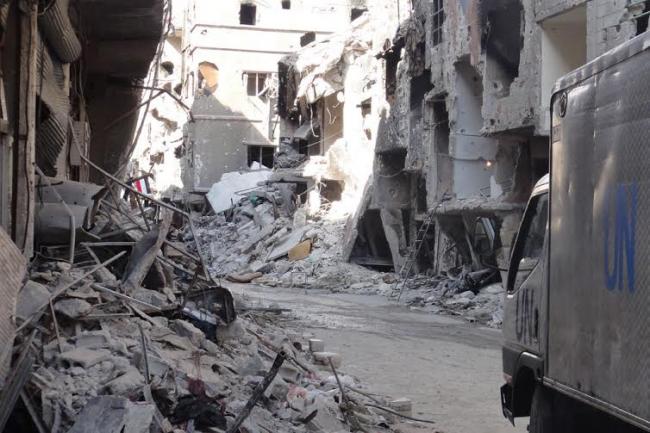Just Earth News/IBNS 02 Feb 2016

Photo: UNRWA (file)
Yesterday’s gruesome attacks coincided with the start of the Geneva talks. The Secretary-General underlines that the Syrian people expect to see credible negotiations in Geneva. They deserve more than the false choice between extremism and repression,” said a statement issued by Ban’s spokesperson.
The bombings, claimed by Da’esh [also known as the Islamic State of Iraq and the Levant, or ISIL], carried out near the Sayidda Zeinab shrine in southern Damascus reportedly left some 60 people dead and may wounded more than100 wounded others.
Condemning the “heinous” bombing, the Secretary-General in his statement extended his deepest condolences to the bereaved families and wishes a speedy recovery to the injured and stressed that those responsible for such attacks on civilians must be held accountable.
Noting that the attacks occurred as the UN-facilitated intra-Syrian talks got under way in Geneva, Ban said in the statement that it is essential that that the representatives of the Syrian government and the Syrian opposition agree on immediate improvements to Syria’s dire humanitarian situation, a political transition that meets the aspirations of the Syrian people, and a parallel ceasefire.
“These talks must produce an outcome that allows ordinary Syrians to decide on their future,” said the UN chief urging all parties to seize the rare diplomatic opportunity provided by the talks.
“It is also incumbent upon the members of the International Syria Support Group (ISSG) to follow through on their commitment to push for safe, sustained and unimpeded humanitarian access throughout Syria, in particular to besieged areas; the release of arbitrarily detained persons; and the immediate cessation of any indiscriminate use of weapons, including through shelling and aerial bombardment,” the statement concluded.
Meanwhile, the UN human rights chief today stressed that no amnesty should be considered for those suspected of having committed crimes against humanity and war crimes in conflict-torn Syria.
“In the case of Syria, [the Office of the High Commissioner for Human Rights] is there to remind everyone that where allegations reach the threshold of war crimes against humanity, amnesties are not permissible,” said UN High Commissioner Zeid Ra'ad Al Hussein, briefing journalists in Geneva.
“Clearly when looking most recently at the forced starvation of people in Madaya – and there are 15 other besieged towns and cities – this is not just a war crime but a crime against humanity if proven in court, and these are very serious issues,” he added.
Noting that the world’s attention is focused on the peace talks, Zeid said he hopes they will end five years of horrific human rights abuses and violations of international humanitarian law.